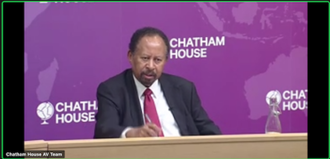The United Nations fails Sudan, again

Dr Abdullah Hamdok
The UN Secretary General's recent report to the Security Council on the war in Sudan had echoes of Bosnia, 30 years ago. In practice, Antonio Guterres's proposals will keep Sudanese civilians alive with humanitarian aid, allowing the militias to kill them at their leisure. Civil society groups warn that while the UN does nothing to halt the flood of weapons into Sudan, the conflict will continue. Speaking at Chatham House in London on October 31st, former prime minister Dr Abdullah Hamdok commented that Guterres's report "fell short of saying anything."
In Sudan, ten million civilians - a quarter of the population - have fled their homes to escape indiscriminate bombing by the warring parties; and more than six million face starvation. There are serious geopolitical implications whichever of Sudan's battling militias wins: Russia and Iran will secure military bases on the Red Sea, with the power to menace international trade; extremist Islamists will once more gain influence; and millions of Sudanese will try to migrate to Europe.
Yet, a deadly combination of racism ("this is what happens in Africa") and other conflicts competing for the headlines ("compassion fatigue") has sidelined Sudan. In response, the United Nations calls on all sides to adhere to international law. Those responsible for the killing have so far faced no consequences, concluding that they can continue the slaughter with impunity.
Twenty years ago, at the height of the targeted ethnic killing in Darfur, I interviewed survivors in an IDP camp there. One 18-year-old called Hawa had been raped so many times she could no longer sit down, even weeks later. She was assaulted, branded, and called a slave by the Janjaweed militia. The Janjaweed has since become the Rapid Support Force, today fighting the Sudanese Armed Forces for control of Sudan's lucrative natural resources.
Hawa's message was simple: "I want to thank your government for sending the food and blankets, but what we really need is for you to take the guns away from the men killing us."
UN Secretary General Guterres's report to the Security Council on October 28th made clear that the same racist motivation guides the targeted elimination of non-Arab Sudanese today. Moreover, the violence now affects much of the country beyond Darfur. The US envoy, Tom Perriello, suggests 150,000 may have been killed since hostilities erupted in April 2023.
However, the UN Secretary General failed to name names: the UN's own investigation shows that the United Arab Emirates is supplying weapons to the Rapid Support Forces, brazenly flying planes into the region. Yet, the UN will not extend the (unenforced) Darfur arms embargo to cover all of Sudan. Egypt, Russia and Iran are backing the Sudanese Armed Forces, although their roles are not mentioned by Guterres.
The Secretary General urged all sides to attend peace negotiations and to obey international law. Yet, neither side will stop fighting so long as they believe they can prevail. While outside countries supply weapons, Sudanese civil society warn that the carnage will not stop.
At the Chatham House meeting, Dr Hamdok, who was overthrown by the military in 2021, called for a no-fly zone over Sudan and an intervention to protect civilians and deliver aid. This is embarrassing territory for the UN: it was the premature withdrawal of the UN/African Union peacekeepers from Darfur in 2020 (despite warnings from NGOs and civil society) that signaled to Sudan's militias that they could resume their ethnic slaughter unimpeded.
The UN Secretary General calls for good behaviour from men with guns who daily prove that they have no concern for civilians. Sudanese civil society, including Dr Hamdok who now heads the Taggadum alliance against the war, has responded by asking the international community to stop waiting for a ceasefire and to start finding ways to protect civilians. Militias control how much aid enters Sudan and how it is distributed, using starvation as a weapon of war. The US envoy believes the Sudanese Armed Forces allow only 10% of aid arriving in Port Sudan to reach those in need.
Back in May 2023, the warring parties signed the Jeddah Declaration, promising to protect civilians and allow unfettered humanitarian aid access. Both sides broke their promises within hours but faced no consequences because there was no mechanism to hold them to account. Leading figures in the Rapid Support Forces and the Sudanese Armed Forces have bank accounts and business entities registered in Gulf nations, and yet no meaningful action has been taken to apply targeted smart sanctions on them or to freeze their assets. Activists such as George Clooney's Sentinel project believe that making it personal is the only way the militias will take notice. Calls for monitoring and recording human rights violations are important for future accountability, but are of little comfort to the millions of Sudanese currently in daily jeopardy.
Sudan's civil society - the Emergency Response Rooms and Resistance Committees - deserve direct and immediate funding to deliver humanitarian aid and medical services to the long-suffering population. They cannot wait for the diplomatic etiquette that renders the UN toothless. The UK will chair the Security Council throughout November. Please write to your MP asking for the your concerns (prioritising the protection of civilians and the delivery of aid) to be conveyed to the Foreign Office. www.TheyWorkForYou.com


















